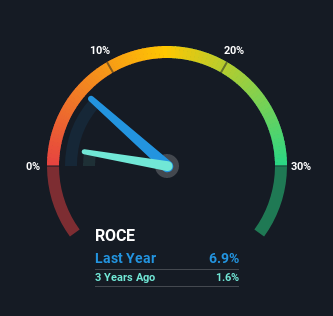Returns On Capital Signal Tricky Times Ahead For Ponni Sugars (Erode) (NSE:PONNIERODE)

If you're looking for a multi-bagger, there's a few things to keep an eye out for. Amongst other things, we'll want to see two things; firstly, a growing return on capital employed (ROCE) and secondly, an expansion in the company's amount of capital employed. Basically this means that a company has profitable initiatives that it can continue to reinvest in, which is a trait of a compounding machine. Having said that, from a first glance at Ponni Sugars (Erode) (NSE:PONNIERODE) we aren't jumping out of our chairs at how returns are trending, but let's have a deeper look.
Understanding Return On Capital Employed (ROCE)
For those that aren't sure what ROCE is, it measures the amount of pre-tax profits a company can generate from the capital employed in its business. The formula for this calculation on Ponni Sugars (Erode) is:
Return on Capital Employed = Earnings Before Interest and Tax (EBIT) ÷ (Total Assets - Current Liabilities)
0.069 = ₹262m ÷ (₹4.3b - ₹471m) (Based on the trailing twelve months to September 2021).
Therefore, Ponni Sugars (Erode) has an ROCE of 6.9%. Ultimately, that's a low return and it under-performs the Food industry average of 12%.
View our latest analysis for Ponni Sugars (Erode)

Historical performance is a great place to start when researching a stock so above you can see the gauge for Ponni Sugars (Erode)'s ROCE against it's prior returns. If you want to delve into the historical earnings, revenue and cash flow of Ponni Sugars (Erode), check out these free graphs here.
So How Is Ponni Sugars (Erode)'s ROCE Trending?
In terms of Ponni Sugars (Erode)'s historical ROCE movements, the trend isn't fantastic. Over the last five years, returns on capital have decreased to 6.9% from 16% five years ago. Meanwhile, the business is utilizing more capital but this hasn't moved the needle much in terms of sales in the past 12 months, so this could reflect longer term investments. It's worth keeping an eye on the company's earnings from here on to see if these investments do end up contributing to the bottom line.
On a side note, Ponni Sugars (Erode) has done well to pay down its current liabilities to 11% of total assets. So we could link some of this to the decrease in ROCE. What's more, this can reduce some aspects of risk to the business because now the company's suppliers or short-term creditors are funding less of its operations. Some would claim this reduces the business' efficiency at generating ROCE since it is now funding more of the operations with its own money.
Our Take On Ponni Sugars (Erode)'s ROCE
In summary, Ponni Sugars (Erode) is reinvesting funds back into the business for growth but unfortunately it looks like sales haven't increased much just yet. And investors may be recognizing these trends since the stock has only returned a total of 16% to shareholders over the last five years. Therefore, if you're looking for a multi-bagger, we'd propose looking at other options.
On a final note, we've found 2 warning signs for Ponni Sugars (Erode) that we think you should be aware of.
While Ponni Sugars (Erode) may not currently earn the highest returns, we've compiled a list of companies that currently earn more than 25% return on equity. Check out this free list here.
New: Manage All Your Stock Portfolios in One Place
We've created the ultimate portfolio companion for stock investors, and it's free.
• Connect an unlimited number of Portfolios and see your total in one currency
• Be alerted to new Warning Signs or Risks via email or mobile
• Track the Fair Value of your stocks
Have feedback on this article? Concerned about the content? Get in touch with us directly. Alternatively, email editorial-team (at) simplywallst.com.
This article by Simply Wall St is general in nature. We provide commentary based on historical data and analyst forecasts only using an unbiased methodology and our articles are not intended to be financial advice. It does not constitute a recommendation to buy or sell any stock, and does not take account of your objectives, or your financial situation. We aim to bring you long-term focused analysis driven by fundamental data. Note that our analysis may not factor in the latest price-sensitive company announcements or qualitative material. Simply Wall St has no position in any stocks mentioned.
About NSEI:PONNIERODE
Ponni Sugars (Erode)
Engages in the manufacture and sale of sugar in India.
Flawless balance sheet average dividend payer.
Market Insights
Community Narratives



